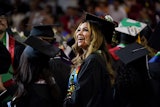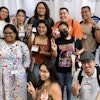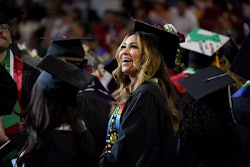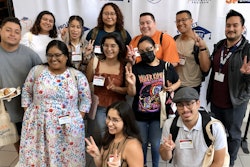How They Beat the Odds
Chicana scientists share stories of overcoming obstacles to achieve professional success
DENVER
Their disciplines range from psychology to mathematics to biology, but
their stories are nearly interchangeable. Chicano women have been
making strides in academia in recent years, but much of that progress
has come while battling racial, cultural and gender prejudice. A group
of Chicano women, all high-ranking academicians, participated in a book
project to provide anecdotes about how they overcame those obstacles to
succeed at some of the foremost academic and government institutions in
the country. They also spoke of their experiences as part of the
“Chicanas in Math, Science, and Education,” panel during the annual
conference of the Society for Advancement of Chicanos and Native
Americans in Science (SACNAS). Obtaining an education in science and
mathematics was no small feat for women of their era, doubly so for
Chicanas.
The number of women earning degrees in the sciences has increased every
year since 1966. A National Science Foundation study shows that as
recently as 1996, only 39 percent of all women enrolled in graduate and
postdoctoral education were in the sciences. That year, 500 more
Hispanic women enrolled in science programs than in 1995. Despite their
gains, however, under-represented minorities still comprise only 11
percent of the enrollment. Of that percentage, 5 percent are Hispanic
and 0.5 percent are American Indian. Enrollment of minority women in
graduate and post-doctoral programs increased slightly between 1980 and
1996, with a 1 percent gain.
But what statistics do not tell are the struggles Chicanas had to
overcome to reach their positions. A book titled Por Sciencia, edited
by Dr. Norma E. Cantú, a professor of English at the University of
Texas at San Antonio, details these pioneering women’s paths in their
own words.
Dr. Elma González, a professor in the department of ecology and
evolutionary biology at the University of California, Los Angeles,
spoke of her childhood in migrant camps in Texas. Her parents took jobs
weeding cotton so their children could stay in school for as long as
possible throughout the year. González had a high-school guidance
counselor who encouraged her to go to college.
Dr. Maria Elena Zavala, a professor of biology at California State
University, Northridge, recalled a conversation that she had with a
teacher as a child. “You’re a Mexican, and you can read!” the teacher
said. Zavala’s mother’s response to her daughter was: “Yes, you are a
Mexican, and you are supposed to read.”
Dr. Cleopatria Martinez, who grew up speaking only Spanish, recalled
how she and her siblings often made their own toys. She described how
she studied the trajectory of their homemade tetherball in order to
win. Martinez said she loved math because she did not have to
“second-guess the teachers’ likes or dislikes. I could simply study the
rules and predict the results.” She said she dreaded the new school
year when teachers would mispronounce her name, followed by students’
laughter. Invariably her teachers would shorten her name to Cleo. She
said she insists on correct pronunciation of her students’ names and is
astounded by the disrespect mispronunciation shows. Martinez now
teaches at Phoenix College, where she chairs the department of
mathematics.
Elvia Elisa Niebla, the national coordinator for the U.S. Department of
Agriculture’s Forest Service Global Change Research Program, spoke
about an incident in her school where her teacher regularly held a
spelling and subject bee. Students in Class A, who were White and
wealthier, competed against students in Class B, comprised of students
from mostly Mexican families. She recalled her classmates’ cheers when
she defeated a Class A competitor. “My victory was theirs,” she said.
Dr. Diana Marinez, dean of the College of Science & Technology at
Texas A&M University, Corpus Christi, said her parents stressed
education and told her she could be whatever she wanted to be. “This
was not typical of the messages that most Mexican American girls got in
border towns in the 1940s,” she said. Marinez struggled to achieve
gender equality at the University of Michigan when she filed a
grievance to attend a “boys’ only” department fishing trip.
Dr. Aida Hurtado, professor of psychology at the University of
California, Santa Cruz, notes that these stories emphasize the enormous
role that parents have in a child’s success. She says Chicano families,
especially a generation or two ago, often encourage daughters to follow
traditional career paths. But these women’s parents gave them the
freedom to pursue their passions.
“The unconditional love of our parents allows us to be warriors and go
into spaces where we’re not wanted and told we should not be,” Hurtado
says. “And they gave us an incredible work ethic and showed us that no
matter what work we do, it’s honorable work. We can bypass prejudice if
that work ethic shines through.”
© Copyright 2005 by DiverseEducation.com















